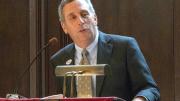President Lawrence S. Bacow opened the fall term on September 4 with a Morning Prayers address, a tradition in which the Harvard president speaks in Memorial Church on the first day of classes. Bacow spoke about the virtues of reflection and contemplation, recounting an informal experiment he once conducted by asking people what they would do with the extra time if there were an eighth day of the week. His address expanded on thoughts he’d shared with freshmen at their Convocation the previous day: “Harvard has endured over centuries,” he told them on Labor Day, “not because it is great, but because it is good, and I look forward to learning about the ways in which you choose to grow in goodness—and in wisdom—over the next four years.” At Morning Prayers, he noted that, to “be our best selves” and “to enable others to do the same,” requires a commitment to making time for rest and renewal. His full remarks from Morning Prayers follow:
Good morning, everyone. This is a very pleasant way to begin the academic year, and I want to thank you all for being here. I hope to see you again a year from now, and for many years after that, as well.
Just after my election as President in February, I had dinner in Cabot with a number of undergraduate students. I asked them about their experience at Harvard College, and they took turns telling me about their concentrations, about their secondary concentrations, their coursework, their co-curricular activities, their extra-curricular activities, their volunteer work, their athletic endeavors, and everything else that they did to devote themselves throughout a given year.
I was exhausted just listening. I then asked them when they have time for contemplation and reflection, and they looked at me as if I came from another planet. Their sense of busyness is nothing new to me, and it’s not unique to Harvard. In fact, in a prior life, I developed an informal experiment to illustrate just how busy we’ve all become. “What would you do,” I would ask, “if you woke up one day and found that there was an eighth day in the week?” And people always responded, “I’d have more time to get my work done.” And then I would say, “Then suppose the next day you woke up and you found that there was a ninth day. What would you do?” “Get more work done.” And I would continue this process until finally, I would say, “And how many extra days of the week do we have to add until you would stop and pause and think and reflect on your life, and the world around you?”
I’ve always found it interesting that all three of the Abrahamic religions embrace the notion of a Sabbath—a day of rest—and that the Eastern religions also each incorporate daily time for contemplation, reflection, and renewal. My wife, Adele, and I are Jewish. And, when we’re in town, we try to make a point of attending Shabbat services on Saturday morning at our synagogue, and we join that congregation in what is known as the sanctuary, as we all gather to acknowledge that we are removing ourselves from our daily routine to seek community and to discover peace.
As we gather today in this sacred space at the heart of our campus, I hope each of us is reminded of the importance of pausing to consider life not in retrospect, or in prospect, but as it is actually being lived. We each have many roles and responsibilities to the world and to others. And we must commit ourselves to the task of thinking continuously about how we can be our best selves and how we can enable others to do the same—on this, our very first day together, and on every day to come.
Thank you. May peace be with you.







